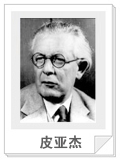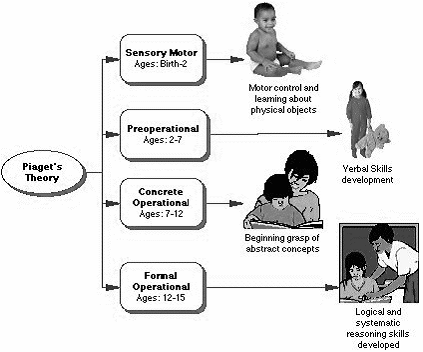皮亚杰(Jean Piaget)
——心理学家、教育家(1896—1980)
——心理学家、教育家(1896—1980)

1921年皮亚杰获得法国国家科学博士学位,同年经日内瓦大学克拉巴莱德( Claparède )的邀请,皮亚杰由巴黎回到日内瓦,并开始任瑞士日内瓦大学卢梭学院实验室主任。1924年起任日内瓦大学教授。先后当选为瑞士心理学会、法语国家心理科学联合会主席,1929年在日内瓦大学任科学思想史教授,兼卢梭学院助理院长。1940年起任日内瓦大学卢梭学院(现改称教育学院)院长兼实验心理学讲座和心理实验室主任。瑞士成立心理学会,他连任学会主席三年。1954年在加拿大举行的第十四届国际心理学会议,被选为国际心理学会主席。此外,皮亚杰长期担任联合国教科文组织领导下的国际教育局局长和联合国教科文组织总干事之职,还是多国著名大学的名誉博士或名誉教授。皮亚杰学识渊博、贡献卓越,于1968年获得美国心理学会的心理学卓越贡献奖,1977 年又获该会桑代克奖以表彰他对教育心理学的贡献。1972年皮亚杰在荷兰获得荣誉地位相当于诺贝尔奖的“伊拉斯姆士”奖金。
皮亚杰早期研究儿童语言和思维等认识的发展。为了致力于研究发生认识论,皮亚杰于1955年在日内瓦创建了“国际发生认识论中心”并任主任,集合各国著名哲学家、心理学家、教育家、逻辑学家、数学家、语言学家和控制论学者研究发生认识论,对于儿童各类概念以及知识形成的过程和发展进行多学科的深入研究。并从此入手,最后创立了发生认识论。
从20世纪30年代开始,把研究成果写成他早期的五本儿童心理学著作。他对自己三个孩子的研究,提供了他创立儿童心理发展理论的重要基础。根据研究结果,写成三本专著,主要论述儿童智慧行为的发生、儿童因果概念和儿童象征行为(模仿和游戏)的开始等问题。1929—1939年的十年期间,坚持研究数学、物理和生物学中主要概念的形成和历史,并在卢梭学院以较大规模从事儿童的动作和思维活动的研究,进行了一系列的实验。1937年在巴黎举行的国际心理学会议上,他提出了关于儿童的具体运算和运算的整体结构的论文。1939—1945年间,从事两方面研究:第一方面,研究儿童到成年期的知觉发展,企图探索知觉与智慧的关系,借以验证格式塔心理学派的论点。第二方面,利用具体的实验技术和分析方法,开始研究儿童的时间、运动和速度概念以及与这些概念有关的行为的发展。1953—1956年在日内瓦先后举行四届儿童发展问题国际讨论会,到会的有英、美、西德、瑞典、瑞土等国的代表,皮亚杰和英海尔德(B.Inhelder)应邀参加会议,并提出了关于儿童心理发展的论文。1955年起,任日内瓦“发生认识论国际研究中心”(Intemational Center of Genetic Epistemoligy)主任。他创立的“发生认识论”主要研究作为知识形成基础的心理结构(即认识结构)和探讨知识发展过程中新知识形成的机制。该中心集合各国著名学者共同研究儿童认识的发生与发展问题,据1970年报道,已出版22卷专著。
皮亚杰早期研究儿童语言和思维等认识的发展。为了致力于研究发生认识论,皮亚杰于1955年在日内瓦创建了“国际发生认识论中心”并任主任,集合各国著名哲学家、心理学家、教育家、逻辑学家、数学家、语言学家和控制论学者研究发生认识论,对于儿童各类概念以及知识形成的过程和发展进行多学科的深入研究。并从此入手,最后创立了发生认识论。
从20世纪30年代开始,把研究成果写成他早期的五本儿童心理学著作。他对自己三个孩子的研究,提供了他创立儿童心理发展理论的重要基础。根据研究结果,写成三本专著,主要论述儿童智慧行为的发生、儿童因果概念和儿童象征行为(模仿和游戏)的开始等问题。1929—1939年的十年期间,坚持研究数学、物理和生物学中主要概念的形成和历史,并在卢梭学院以较大规模从事儿童的动作和思维活动的研究,进行了一系列的实验。1937年在巴黎举行的国际心理学会议上,他提出了关于儿童的具体运算和运算的整体结构的论文。1939—1945年间,从事两方面研究:第一方面,研究儿童到成年期的知觉发展,企图探索知觉与智慧的关系,借以验证格式塔心理学派的论点。第二方面,利用具体的实验技术和分析方法,开始研究儿童的时间、运动和速度概念以及与这些概念有关的行为的发展。1953—1956年在日内瓦先后举行四届儿童发展问题国际讨论会,到会的有英、美、西德、瑞典、瑞土等国的代表,皮亚杰和英海尔德(B.Inhelder)应邀参加会议,并提出了关于儿童心理发展的论文。1955年起,任日内瓦“发生认识论国际研究中心”(Intemational Center of Genetic Epistemoligy)主任。他创立的“发生认识论”主要研究作为知识形成基础的心理结构(即认识结构)和探讨知识发展过程中新知识形成的机制。该中心集合各国著名学者共同研究儿童认识的发生与发展问题,据1970年报道,已出版22卷专著。
Jean Piaget(1896―1980)
